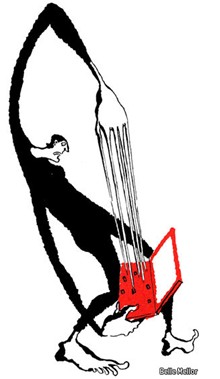考研阅读精选:真的上瘾了吗?
来源:新东方在线
发布时间:2017-01-04
『强迫性上网行为是否应视为网瘾以及应如何治疗,心理健康专家对此众说纷纭。』
Addicted? Really?
真的上瘾了吗?
Mar 10th 2011 | from The Economist

CRAIG SMALLWOOD, a disabled American war veteran, spent more than 20,000 hours over five years playing an online role-playing game called “Lineage II” . When NCsoft, the South Korean firm behind the game, accused him of breaking the game’s rules and banned him, he was plunged into depression, severe paranoia and hallucinations . He spent three weeks in hospital. He sued NCsoft for fraud and negligence , demanding over $9m in damages and claiming that the company acted negligently by failing to warn him of the danger that he would become “addicted” to the game.
But does it make sense to talk of addiction to online activity? Mental-health specialists say three online behaviours can become problematic for many people: video games, pornography and messaging via e-mail and social networks. But there is far less agreement about whether any of this should be called “internet addiction”—or how to treat it.
Back in 2000 Joseph Walther, a communications professor at Michigan State University, co-wrote an article in which he suggested, tongue in cheek , that the criteria used to call someone an internet addict might also show that most professors were “addicted” to academia . He argued that other factors, such as depression, are the real problem. He stands by that view today. “No scientific evidence has emerged to suggest that internet use is a cause rather than a consequence of some other sort of issue,” he says. “Focusing on and treating people for internet addiction, rather than looking for underlying clinical issues, is unwise.”
Others disagree. “That would be wrong,” says Kimberly Young, a researcher and therapist who has worked on internet addiction since 1994. She insists that the internet, with its powerfully immersive environments, creates new problems that people must learn to navigate .
No one disputes that online habits can turn toxic. But compulsive behaviour is not limited to gamers. E-mail or web-use behaviours can also show signs of addiction. Getting through a business lunch in which no one pulls out a phone to check their messages now counts as a minor miracle in many quarters.
Pornography is hardly new, either, but the internet makes accessing it much easier than ever before. When something can be summoned in an instant via broadband, whether it is a game world, an e-mail inbox or pornographic material, it is harder to resist.
Treatment centres have popped up around the world. In 2006 Amsterdam’s Smith & Jones facility billed itself as “the first and, currently, the only residential video-game treatment program in the world”. In America the reSTART Internet Addiction Recovery Program claims to treat internet addiction, gaming addiction, and even “texting addiction”.
Yet many people like feeling permanently connected. As Arikia Millikan, an American blogger, once put it, “If I could be jacked in at every waking hour of the day, I would, and I think a lot of my peers would do the same.” Bob LaRose, an internet specialist at Michigan State University, doesn’t believe her. In his research on college students, he found that most sense when they are “going overboard and restore self-control”. Less than 1% have a pathological problem, he adds. For most people, internet use “is just a habit—and one that brings us pleasure”. (533 words)
Lineage II: “天堂II”,一款大型多人在线角色扮演网络游戏,由韩国游戏公司NCSoft开发。具有逼真的全3D立体画面,血盟可以进行升级及转职,较注重职业间搭配,需与其他玩家组队合作。
accuse sb (of sth): 控告(某人);控诉(某人);谴责(某人)
plunge into sth: 陷入某状态。如:The news plunged us into despair. (我们听到那消息后就陷入了绝望。)
paranoia 9pArE5nRIE n. 偏执狂;妄想狂
hallucination hE9lu:sI5neIFn n. 幻觉
sue sb (for sth): 控告(某人);诉讼(某人)
fraud frR:d n. 欺骗(行为);欺诈
negligence 5neglIdVEns n. 疏忽;过失
pornography pR:5nCgrEfI n. 色情(或淫秽)材料
messaging 5mesIdVIN n. 短信收发
tongue in cheek: 有反话意味地;开玩笑地。如:The offer was made almost tongue in cheek.(这种提议差不多只是说说而已。)
academia9AkE5demIE n. 学术活动
stand by: 坚持认为;坚决支持
因特网的使用是引发其他问题的起因,而不是因其他问题造成的后果,这一论点并无科学依据。
therapist 5WerEpIst n. 治疗专家
immersive I5m:sIv adj. 沉浸式的
navigate 5nAvIgeIt v.(有效地)处理。如:There’s no one I trust more to navigate these tricky political situations. (没有一个能让我更信赖的人可以处理这些复杂的政治局面。)
No one disputes that online habits can turn toxic: 上网的习惯会导致弊端是无可置疑的。
compulsive kEm5pQlsIvadj. 强迫性的
如果在一个商业午餐中,没有一个人拿出手机检查信息,许多人会觉得这是一个小小的奇迹。in many quarters意为“在许多人当中”,如:Concern has been expressed in many quarters about the policy.(许多人已表达了对这项政策的关注。)
access 5Akses v. 接近;进入
pop up: 突然出现;迅速出现。如:The daffodils and tulips are popping up everywhere.(水仙花和郁金香从四处一下子冒了出来。)
Smith & Jones: 史密斯与琼斯治疗中心,位于荷兰阿姆斯特丹市,提供戒毒和戒酒方面的医疗服务。
bill sb/sth as sth:(把人或事物)说成是……,宣传为……。如:Some patients are receiving what has been billed as a revolutionary treatment.(有些病人正在接受所谓的革命性治疗。)
reStart Internet Addiction Recovery Program: reStart网瘾康复项目,美国首家网瘾康复中心,位于美国华盛顿州。
课程 文章 问答 资讯 评论 百科
- 比较正规的考研培训机构12-04
- 研究生考试辅导培训课程哪家好12-04
- 考研网络课程哪个比较好12-04
- 考研专业课培训哪个机构好12-02
- 哪个培训班的考研比较好11-29
- 比较靠谱的考研辅导班11-29
- 考研英语一阅读教学视频06-14
- 烟台考研英语辅导06-14
- 考研网课补习班哪个好03-04
- 考研培训班哪家网校好03-04
- 考研辅导视频教程哪个好03-04
- 考研培训机构哪一家好03-04
- 考研培训班哪个机构的好12-04
- 考研网课机构哪个比较好12-04
- 考研专业课辅导班班哪个好12-04
- 网上哪个考研培训班靠谱12-04
- 哪个考研培训机构比较靠谱12-02
- 考研政治课程哪个网课比较好12-02
- 西综考研哪个老师讲得好03-31
- 管综考研哪个老师好03-17
- 护理考研哪个老师讲得好03-16
- 考研政治网课哪个老师好03-16
- 考研数学网课哪个老师讲得好03-15
- 考研英语网课哪个老师好03-14

